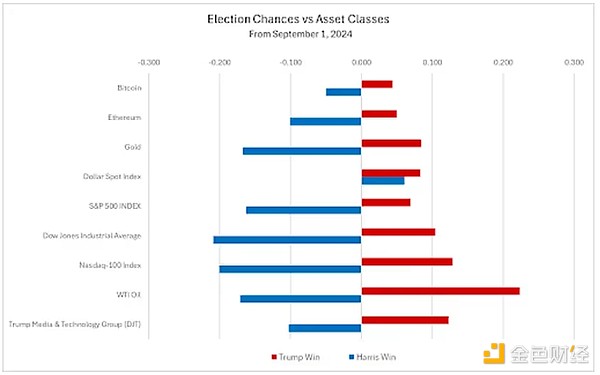By Alex Tapscott, CoinDesk; Translated by Deng Tong, Golden Finance
Bitcoin has been surging recently, and so have the odds that Donald Trump will win this week’s U.S. presidential election, at least according to prediction markets like PredictIt and Polymarket.
Bitcoin recently broke through $73,000, nearly hitting its previous all-time high, on the same day that Trump’s odds of winning the election on betting market Polymarket hit 69%, the highest level since the failed assassination attempt on the former president in June.
Many experts believe Bitcoin’s recent strength is a sign that investors are positioning themselves for a potential Trump win. Others go a step further, arguing that recent strength in U.S. stocks and even the dollar is being driven by the Trump bet, as investors expect tax cuts to boost corporate profits and protectionist trade policies to strengthen the dollar.Collectively, this is known as the “Trump trade,” and if you read the newspapers and more than a few sell-side reports, you’ll see that it’s very popular!
It’s a neat narrative (albeit a disturbing one), but is it really true?
To find out, we looked to the data.
Prediction markets are a great place to start. Polymarket and PredictIt allow bettors to bet on who will win the election. Until recently, the two candidates were neck and neck, but recently, Trump’s odds have started to rise. So we took the odds from the past two months from two prediction markets, averaged them both, and then analyzed the correlations with other asset classes, securities, and indices.
A score of 1 means 100% correlation, and 0 means no correlation. A score of -1 means two things are 100% negatively correlated.
Here’s what we found:

Not surprisingly, Truth Social’s owner, Trump Media & Technology Group (DJT), was more likely to do better when Trump’s odds of winning went up. The stock market has a 10% positive correlation with Trump’s odds. Bitcoin has almost no correlation with either. So the Trump rally is in the data, but it’s fairly mild and likely wildly overstated.
To be sure, prediction markets are just one data point. Fortune recently reported that a third of activity on Polymarket was wash trades designed to make them appear more popular than they actually are, or, as some critics put it, to “prop up” Trump’s odds. Not everyone is pricing in prediction market data, and many may discount it given its novelty. Still, as Bloomberg recently reported, Wall Street is watching closely, and so must we.
Weak correlations and exaggerated narratives should provide some comfort from fears about the election as a huge catalyst for markets.
My personal view is that this election is short-term negative, but very long-term positive, regardless of the outcome. In the short term, a Trump win could be a “buy the rumor…sell the news” event given prices are near all-time highs, while a Harris win could result in a knee-jerk reaction as some traders simply assume she will be worse for the asset class. Longer term, no matter who is president, Web3 adoption is accelerating as finance and other industries digitize, and deficit spending will continue to create demand for alternative stores of value like Bitcoin.
Who’s better for crypto – Harris or Trump?
I generally think people overstate the impact of the person in charge. That’s not to say that the administration won’t impact new industries and markets.
In fact, there are a lot of things a new administration could do, such as:
Encourage Congress to pass industry-friendly legislation, such as the Stablecoin Act
Clear the way for more corporate issuers to list on U.S. exchanges
Reset the relationship between the SEC and the Web3 industry
Reform financial services regulation to create more room for innovation
Open up energy markets and encourage Bitcoin miners to move their operations to land.
I think much of this is sensible and even long overdue.
But I remain skeptical that Donald Trump can be the standard-bearer for real, positive progress in this space. He has a history of lacking patience or even sustained interest in addressing many of his priorities, and he is notorious for changing his mind when it’s no longer politically helpful.
His economic plans could also backfire on many businesses and industries, including cryptocurrencies. Business leaders might welcome a tax cut from 21% to 15%, but as the right-leaning think tank Cato Institute has argued, his economic plans will exacerbate deficits and cause inflation to surge again.
Some argue that this confusion is the point. Mark Cuban, an outspoken billionaire investor who supports Harris, argues that venture capitalists and tech types support Trump precisely because they believe his tax cuts, deficit spending plans, and tariffs will lead to inflation, causing Bitcoin to surge.
That feels a little cynical. The president simply doesn’t have that much influence. Plus, businesses can’t succeed in a world where they fail (though Bitcoin perhaps can).
Those who have worked closely with him often tell us how easily Trump can be swayed on issues.
Recent reports suggest that Trump’s primary interest is in using cryptocurrencies to make money, as evidenced by the launch of his own DeFi project, World Liberty Financial (WLF). Even Trump supporters are nervous about WLF, as they rightfully worry that it will undermine confidence in the industry and make Trump’s recent pivot appear insincere.
Trump’s cryptocurrency stance is a modern take on the old adage “what’s good for GM is good for America.” Replace “GM” with “Trump Corp.” and you’re not too far off from his view on the role of government.
Will his interest in crypto wane when it no longer suits him? That’s a question many pro-crypto voters should consider carefully before casting their ballots.
 Hui Xin
Hui Xin
 Hui Xin
Hui Xin Joy
Joy Jasper
Jasper Hui Xin
Hui Xin Jasper
Jasper Jasper
Jasper Jasper
Jasper Jasper
Jasper Hui Xin
Hui Xin Hui Xin
Hui Xin